2019 International Year of Indigenous Languages: Word of the Week – Week Seventeen.
By Administrator | 24 April 2019
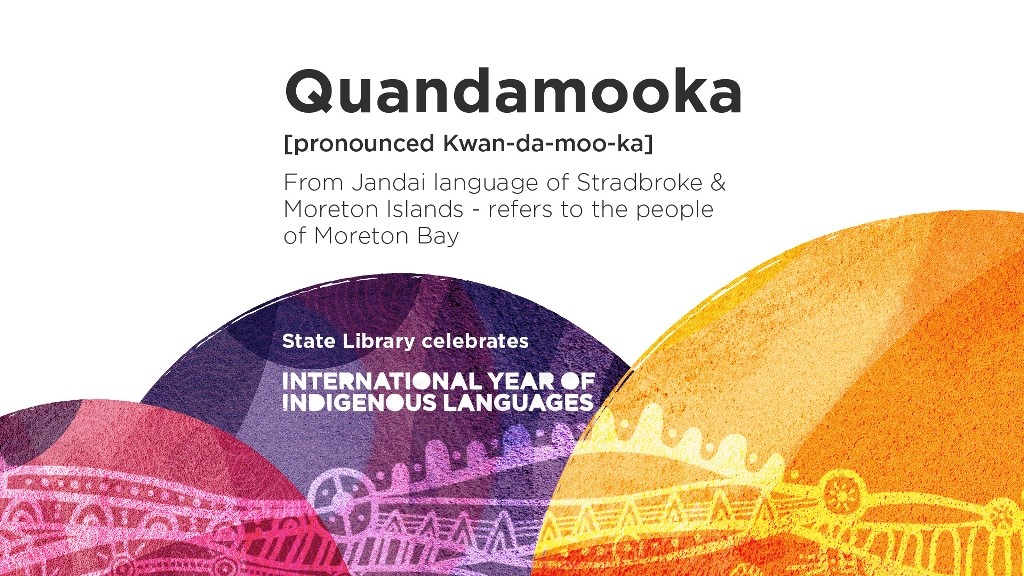
As part of State Library's commitment to the 2019 International Year of Indigenous Languages, we will be promoting a 'word of the week' from one of the 125+ Aboriginal and Torres Strait Islander languages and dialects from across Queensland.
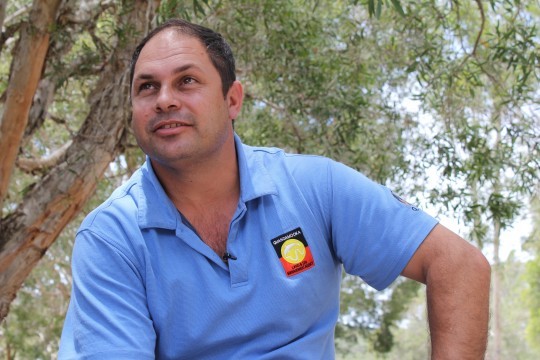
Cameron Costello, CEO, Quandamooka Yoolooburrabee Aboriginal Corporation (QYAC).
To coincide with Cameron Costello speaking as part of the Game Changers series, Week 17's word is Quandamooka , from the Jandai language of North Stradbroke Island – this word refers to the people of Moreton Bay and takes in the Ngugi of Moreton Island, Nunukul of North Stradbroke and the Goenpul of the inner islands and adjacent mainland.
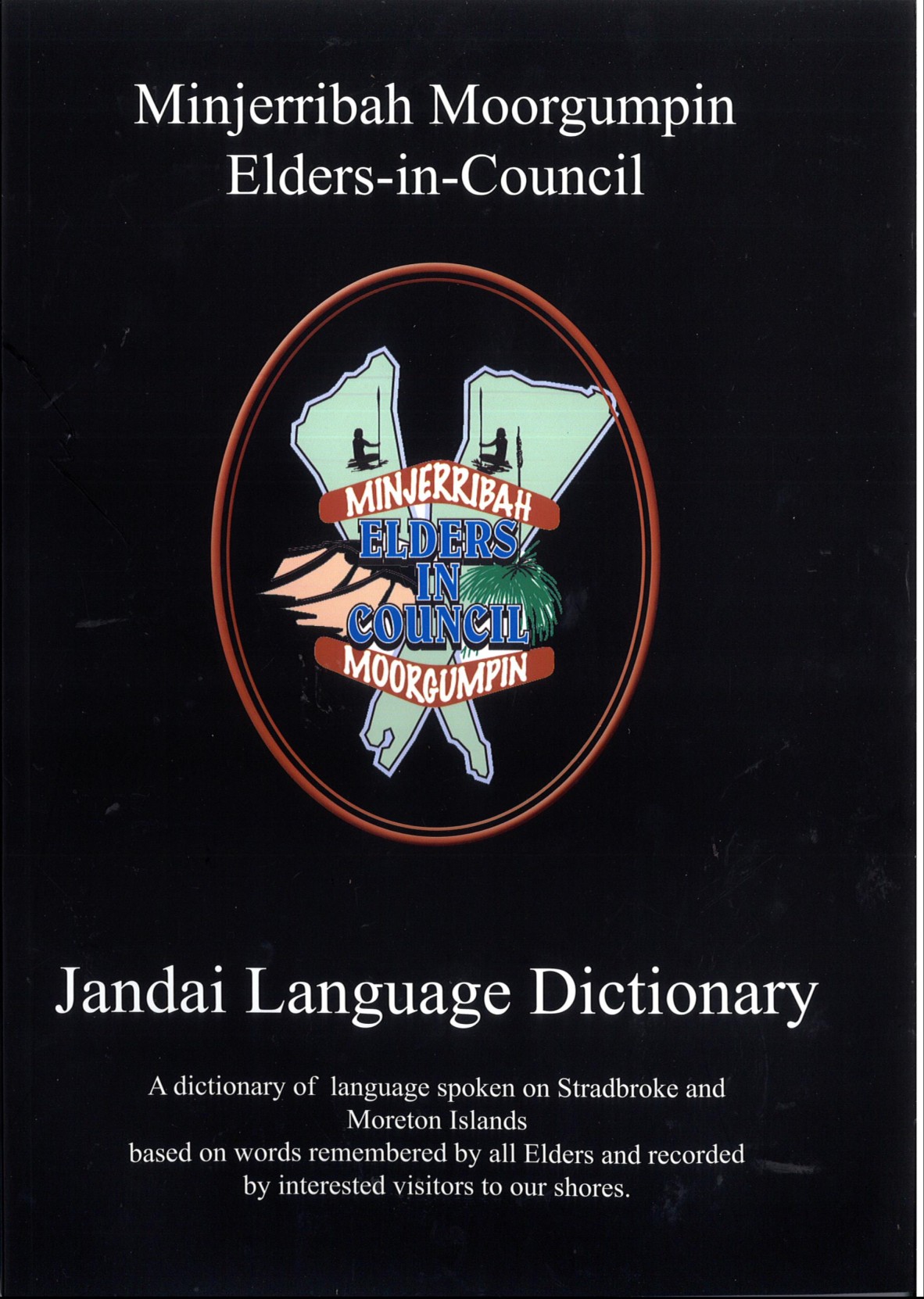
Jandai Language Dictionary. HKT 499.153 JAN
This week's word is sourced from a community dictionary of Jandai compiled in 2011 by the Minjerribah Moorgumpin Elders-in-Council Aboriginal Corporation and includes knowledge of Elders, language custodians and visitors to Moreton Bay who documented language. This corporation is actively involved in the revival of language on North Stradbroke Island - all of the Moreton Bay languages are considered endangered and there are a number of community language workers and families undertaking language activities across the community. Some of this work will be showcased at the upcoming Quandamooka Festival which will feature a language forum in June.
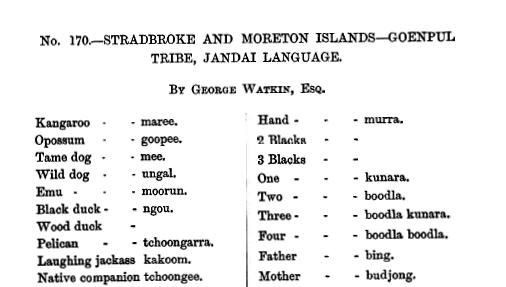
Curr 170. Stradbroke and Moreton Islands.
Jandai is also known as Jandewal, Djandai, Djendewal, etc. and is closely related to the neighbouring language of Yugara. The above image is one of the earliest wordlists collected from Stradbroke Island and published in Curr's The Australian Race: its origins, languages, customs, place of landing in Australia and the routes by which it spread itself over that continent. George Watkins was the Dispenser and Assistant Director at the Benevolent Asylum, Dunwich in 1868 and had a keen interest in the Aboriginal people of North Stradbroke Island. During his time there, Watkins collected over 250 words from Aboriginal community members. As well as the list in Curr, Watkins later published a booklet Notes on the aboriginals of Stradbroke and Moreton islands in 1891 which provides further background notes on the Aboriginal people of Moreton Bay.
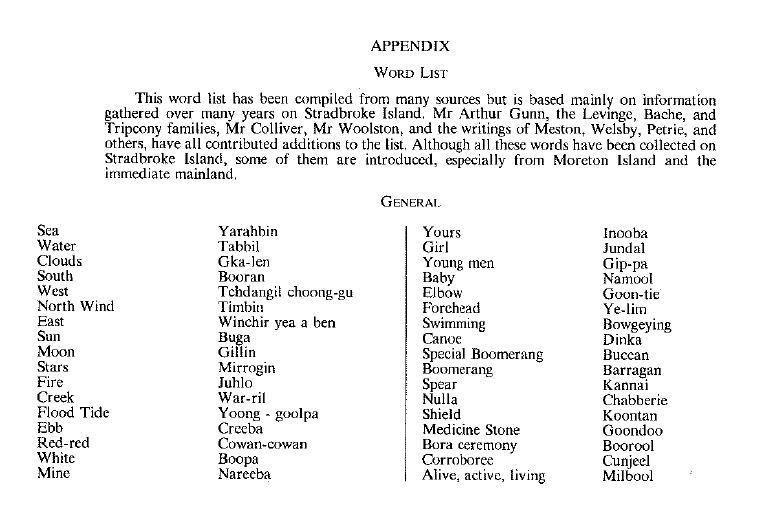
Another source of language material from North Stradbroke Island is the work of Colliver and Woolston published in the Proceedings of the Royal Society of Queensland. Their work collates earlier work of Watkins as well as wordlists collected by Welsby and Meston who were frequent visitors to the islands of Moreton Bay.
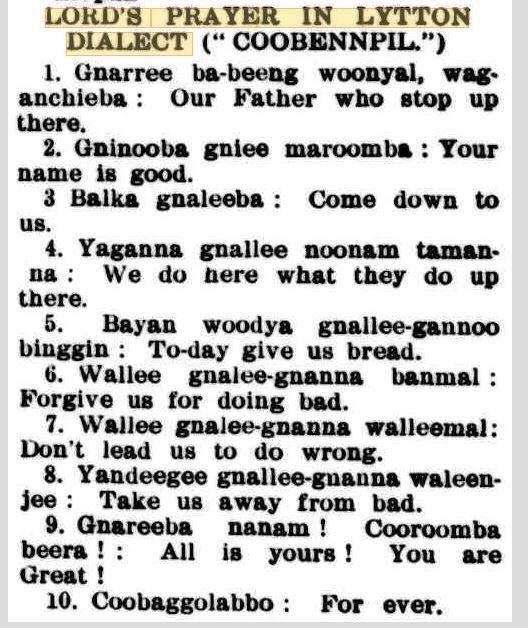
"Lord's Prayer in Lytton Dialect".
One of the more unusual Moreton Bay texts collected by Meston is the above "Lord's Prayer in Lytton" dialect which he describes as Coobennill (Goenpul) - this was published in The Queenslander newspaper of 14 November 1903.
All of the above-mentioned works are held in the State Library collections and can be accessed via One Search, using the search terms of Jandai, Nunukul, Ngugi or Goenpul.
State Library of Queensland invites you to celebrate the 2019 International Year of Indigenous Languages as we raise awareness of the rich diversity of Queensland’s Aboriginal and Torres Strait Islander languages.
Join the conversation as we post a new word for each week!
Week Seventeen 23-29 April 2019.
#IYIL2019 #IYIL #IY2019WordoftheWeek #SLQIndigenousLanguages
Desmond Crump
Indigenous Languages Coordinator, State Library of Queensland
State Library of Queensland Aboriginal and Torres Strait Islander Languages Webpages
State Library of Queensland Aboriginal and Torres Strait Islander Languages Map
UN IY2019 Links
UN International Year of Indigenous Languages webpages
UN International Year of Indigenous Languages Resources
References
The word of the week has been sourced from the following items in the State Library collections.
Source: Minjerribah Moorgumpin Elders-in-Council Aboriginal Corporation (2011) Jandai language dictionary: a dictionary of language spoken on Stradbroke and Moreton Islands based on words remembered by all Elders and recorded by interested visitors to our shores. HKT 499.153 JAN
Websites
Minjerribah Moorgumpin Elders-in-Council website
Quandamooka Festival website
Quandamooka Yoolooburrabee Aboriginal Corporation website
Further Reading
Other materials in the State Library collections relating to Jandai and related languages include the following:
Colliver, F. S. and Woolston, F. P. (1986) Aboriginals in the Brisbane Area. PAM 994.30049915 1986
Colliver, F. S. and Woolston, F. P. (1975) "The Aborigines of Stradbroke Island." in Proceedings of the Royal Society of Queensland, 86 (16), 1975. VF 572.99432 COL
Curr, E. M. (1887) The Australian Race: its origins, languages, customs, place of landing in Australia and the routes by which it spread itself over that continent. RBF 572.994 cur
Holmer, N. (1983) Linguistic Survey of South-Eastern Queensland. J 499.15 HOL
Meston, A. (undated) Archibald Meston Papers Undated. OM64-17
Meston, A. (200?) Morton Bay and Islands. J 994.32 MES
The Queenslander (1903) Meston "Morton Bay and Islands, IV" 14 November 1903, p. 26. Online via Trove.
Watkins, G. (1891) Notes on the aboriginals of Stradbroke and Moreton islands. P 306.089 wat
Watson, F. J. (1944.) Vocabularies of four representative tribes of South Eastern Queensland. Supplement to the Journal of the Royal Geographic Society of Australasia (Queensland), No. 34, Vol. XLVIII. REFJ 499.15 wat
Welsby, T. (1916) “Recollections of the Natives of Moreton Bay together with some of their names and customs of living.” (Typescript) 6758 Box 11392.
Comments
Your email address will not be published.
We welcome relevant, respectful comments.